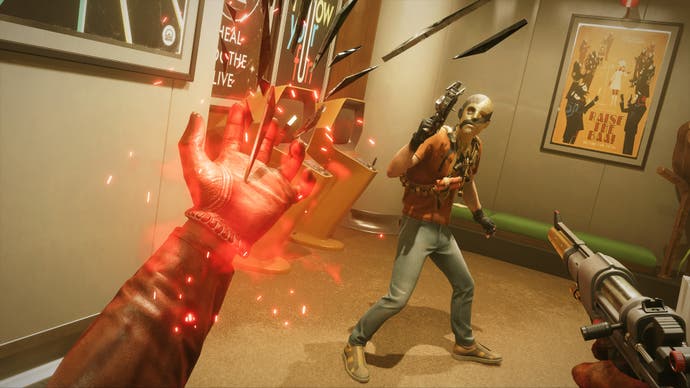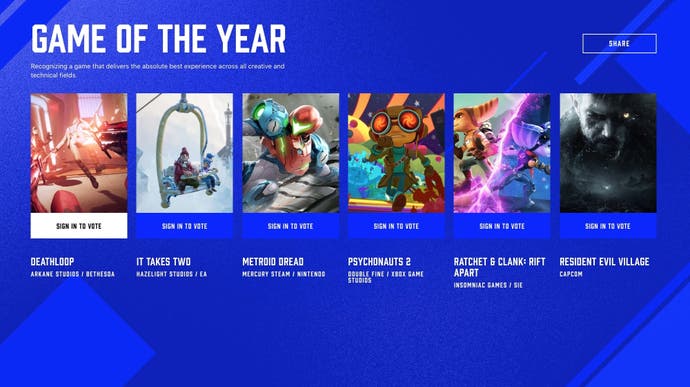Letter from the Editor: The trouble with game awards
Games have never been more diverse, but that's seldom reflected in games of the year lists. Why?
It's that time of year when every games publication rolls out its best-of-the-year lists, and the calendar-topping Game Awards looms large. It's hardly a phenomenon unique to games; every broadsheet culture section is busy recapping and ranking books and TV shows right now (though awards are different - the film industry, for one, spins out its laborious and intensely political awards season well into the following year).
Personally, I love it. I get a superficial enjoyment from the argument and speculation and positioning that goes with ranking things and selecting winners, however spurious the criteria and comparisons may be - of course I do, I'm only human. But what I really love is the more important and worthwhile process that lies beneath that: taking stock, joining the dots, finding the trends, celebrating great artistry. Pausing the relentless march towards the next thing to take a moment to enjoy what we've had.
We'll make our own contributions to this recap economy, of course - choosing our game of the year over the Christmas break, as well as publishing the results of our reader's poll, as we always do. We've also contributed, along with many other people and publications, to the Game Awards voting. We do it proudly and we enjoy it.
It's time to acknowledge that there's a big problem with this process, though, which might not be unique to games, but might be more severe in our artform than any other.
It's this: the number of individual critics, or people of any sort, who have played enough games to have a good overview of just the year's most significant releases is vanishingly small. It might even be non-existent. So we pool our resources and our expertise, of course, and do our best to form a collective judgment. The process works well enough in aggregate, but the individual building blocks of it are on shaky ground. Any games writer who doesn't work full-time on reviews - and even some who do - might struggle to put together a personal top 10, because they might not have played enough games they like to qualify that year.

It's no great mystery why this happens. Games are very time consuming to play thoroughly, so you can only get through so many. They are also enormously diverse not just in content but in form, and they demand active engagement from the player. This leads to more specialisation among players and critics than in other artforms; you will rarely find a film critic who considers themselves unqualified to write about musicals, for instance, but there are many game writers who would never dare pronounce judgment on a strategy game.
This problem has become more acute over the last decade or so as the shape of the games industry and the games themselves have changed. AAA blockbusters have consolidated and shrunk in number, while there's been an explosion of enormously creative and diverse lower-budget games (let's just call them "indies" and save that argument for another day) that demand consideration. Meanwhile, "live" or "service" games extend their lifespans over years, which has had two effects: there's now a hugely important sector of gaming that has effectively removed itself from consideration as part of the annual release cycle, and games writers are sinking hundreds of hours of playtime into these games - whether professionally or for fun - that aren't being spent on keeping up with the new releases. (I've played a lot of Forza Horizon 5 this year, for example, but that will be nothing compared to the hundreds of hours I'm bound to sink into it next year, when it won't be up for any awards or lists.)
It's a pronounced reflection of something that's happening in wider culture - our tastes and attention are getting atomised into ever more specialised and curated niches, which are then siloed off from each other. Meanwhile the common ground where we all meet is shrinking to an ever-smaller patch.
This is how you end up with a list of Game of the Year nominees such as that presented by the Game Awards. Not that any of these six games are bad - they're all plausible contenders and a couple are genuinely brilliant. But they are all character-action games from major publishers. It Takes Two, a co-op game by Hazelight, is probably the furthest outlier in terms of content and budget (though Metroid Dread may not have been a much larger production, for all its brand lustre). Four of the six games are sequels. Despite a rapturous reception, Forza Horizon 5 is passed over, perhaps because it belongs to one of those specialised genres - racing, sports, strategy - that seem to be excluded from the consensus middle-ground, despite their enormous popularity. This year's cavalcade of fantastic games from smaller studios isn't represented at all.

This narrow pool isn't necessarily the fault of the Game Awards organisation or the composition of its voting body. It's at least partly because the meeting-ground at the centre of games, where all our diverse tastes collide, has got so small. Nor is it always big-budget games from major publishers that are the beneficiaries of this groupthink. Last year, genuine indie production Hades swept every game of the year award going (including our own), but it was hard to shake the feeling that this was because it had dominated conversation on Games Twitter and was one of those rare games everyone felt they had to play or be left out of the conversation. Hades deserved the acclaim, it's brilliant, but such homogeneity of opinion can't be healthy for games, or really representative of the artform.
(Just to play devil's advocate for a second, you should also be careful what you wish for. Over in the film world, the Oscars, under severe and justifiable criticism for its lack of diversity, has vastly expanded and diversified its voting body in recent years, which has had many positive effects, including more diverse and artistically adventurous nominations and an unprecedented Best Picture win for the Korean thriller Parasite a couple of years ago. But it has also steered the Academy even further away from popular taste, in terms of the films normal people actually go and see, and towards its own impending irrelevance.)
I am not sure how we begin to correct this. Of course, promoting more diverse voices within criticism will be important. But I also think it has to start with us, as critics, finding ways to play more widely and think more broadly, to draw from a wider pool. We need to dare to form opinions sooner, without pouring dozens of hours into a game, and we need to push ourselves outside of our genre comfort zones. We need to stop gatekeeping our own tastes, and let some of the rest of this mad medium in.

